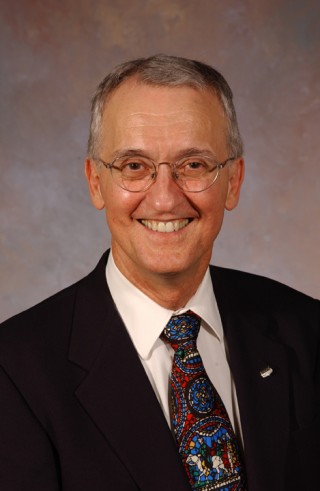
By Molly Packer
Reporter
It’s not very often that a professor throws a beach ball into a sea of students in Kayser Auditorium in order to illustrate a point during the first lecture of their freshman year.
But Dr. Tom Hanks is no ordinary professor.
The first time the Baylor Interdisciplinary Core class of 2014 encountered Hanks was at the BIC’s Welcome Week dinner last fall. Sitting at a table of seven or eight exhausted and silent young scholars, he inquired about each of their hometowns, giving each student a chance to mumble a “Houston” or “Dallas” or “Cincinnati.”
Five minutes later, the students at the table were vibrantly discussing the literary merit of “Harry Potter” and “Twilight” with Hanks.
Before Hanks, English professor, stood up to give his first BIC lecture, he had made a lasting impression on the students’ minds.
After three and a half decades of teaching at Baylor, Hanks is one of the most beloved professors on campus. Though he mainly teaches English majors, Hanks teaches classes for all majors, including a course on English author Geoffrey Chaucer and a section of World Cultures I, a BIC class for freshmen, a BIC capstone and a senior thesis class.
But Hanks does not just instruct students. Hanks said he tries to do exactly what C.S. Lewis argued the “task of the modern educator” should be — he irrigates arid minds with dewy imagination.
According to his students, Hanks’ diverse course topics, passion and enthusiasm allow him to easily enter the hearts and minds of his students. Most students at Baylor have heard a lecture of Hanks or at least heard stories from a friend or roommate.
His first lecture to BIC freshmen has become legendary — the students pass a beach ball around Kayser Auditorium to symbolize the sharing of ideas. His reference to students as “colleagues” is an indicator of Hanks’ easy and relatable attitude.
Hanks is well known for bringing what could be boring lectures to life. Dallas freshman Charlie Foster, who was in Hanks’ first semester World Cultures I small group class, has many fond memories of the professor.
“He has character and he’s humorous,” he said. “It helps enliven the learning environment. He’s also creative and witty. It’s always a new way of learning. It’s not just a discussion.”
Austin freshman Louisa Hudec also loved having Hanks as a teacher.
“He’s a very eccentric gentleman of old,” she said. “He treated us as if our ideas were valuable. We used to write journals for class and he would print out people’s entries to share ideas the writer had with the class.”
Hudec remembers that Hanks always told the class how much he enjoyed them and accompanied his teaching with a bit of light teasing.
“He teased, but very lightly so that it never hurt anyone,” Hudec said.
When asked which class is his favorite to teach, Hanks immediately spills several he loves. Then he pauses.
“My favorite class is always the class I’m currently teaching,” he decides. “I waffle over the map.”
When it comes down to it, Hanks concludes the reason he loves teaching is the students.
“I love getting students of all majors motivated to learn and interact,” he said.
Hanks taught his first class in the late 1960s while on leave from his usual position as an information officer in the U.S. Air Force stationed in Vietnam. After teaching at the U.S. Air Force Academy in Colorado Springs, Colo., Hanks was told he needed to return to Vietnam for another six weeks before coming back to Colorado to teach.
Hanks did not like the idea of returning to the position in Vietnam.
“I’m opposed to aiding and abetting people who want to kill other people — especially me,” he said.
For that reason, Hanks did not return to Vietnam and instead earned his Ph.D. at the University of Minnesota. He has been gracing Baylor’s lecture halls for the past 34 years.
Since then, Hanks has earned nearly every teaching award Baylor has to offer and he proudly displays all of them in his office. He is a master teacher and has been recognized for his teaching ability by Baylor’s presidents many times. He has published several articles, most of them about Sir Thomas Malory’s and Geoffrey Chaucer’s works, and edited several books. Through it all, Hanks wants to remain as humble as the day he began teaching.
Before long, Hanks shares about the class he is teaching this semester about Oxford Fantasists. The course looks at stories like Sir Thomas Malory’s “La Morte d’Arthur,” J.R.R. Tolkien’s “The Lord of the Rings” and J.K. Rowling’s “Harry Potter.”
Hanks says that the truth in literature lies between allegory and story. All the fantasy stories he examines are based on Sir Malory’s work that operates as a tragedy and a Christian comedy ultimately exploring the Christian faith.
Even though Hanks has been teaching for several decades, he still finds great excitement in exploring the unknown and sharing his excitement with students.
“He personally connects to students instead of being a simple professor at the front of the room,” Foster said.
With Hanks’ style of teaching, ideas and thoughts can easily be passed through generations.
And so, colleague, the “idea” beach ball will roll on.






